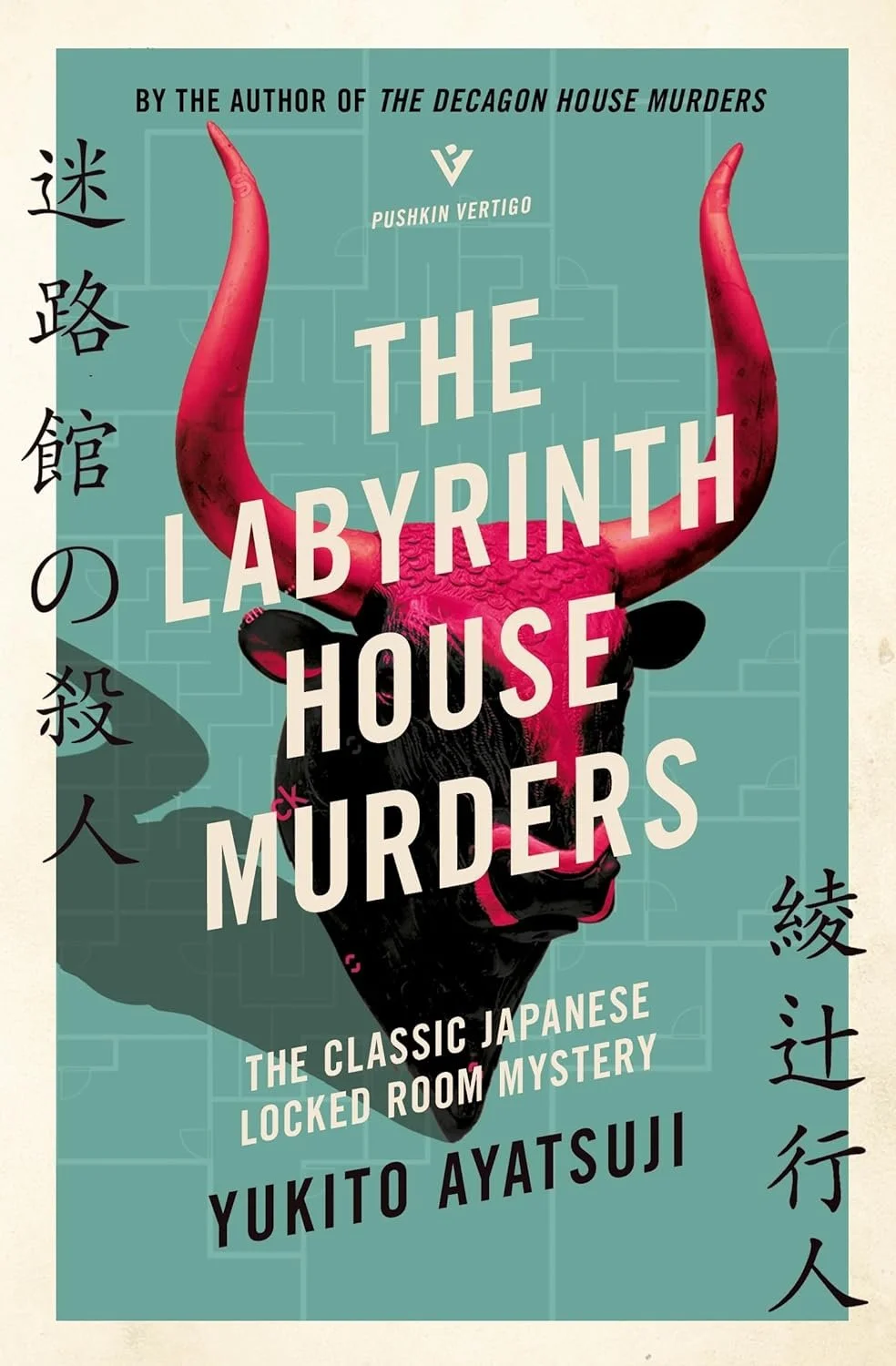The Labyrinth House Murders by Yukito Ayatsuji
Publication Date: May 13, 2025 | Pushkin Vertigo | 272 pages
A good mystery — a well constructed, carefully crafted whodunnit — should leave readers guessing about the identity of the culprit right on up until the grand (and, occasionally, grandiose) finale, when that very last domino tips over and all stands smartly and logically revealed.
By this criteria, then, The Labyrinth House Murders by Japanese author Yukito Ayatsuji is a successful mystery. That does not, however, make it a satisfying mystery. Although it is smartly constructed, with plenty of reveals and cunning wordplay, and Ayatsuji is careful not to overplay his hand or leave behind too many obvious clues, the work never manages to bridge that gap between logic and emotion to truly connect with it or make it memorable. There’s a certain cold calculatedness to the work as a whole, befitting the work’s place a logic puzzle, but Ayatsuji fails to give readers much of a reason to care for the book’s happenings beyond simply being a puzzler. The Labyrinth House Murders is a nice mental exercise, but it makes for a fairly shallow story.
I’d be lying if I said The Labyrinth House Murders didn’t have my full attention, though. I found myself curious to see how the victims lured into this underground, labyrinthine puzzle-house would be dispatched and whether or not my guesses about the murderer and the clues left behind, formed quite early on in the proceedings, were accurate. Ayatsuji’s novel revolves around a dying mystery writer, Miyagaki Yōtarō, hosting four of the genre’s greatest up-and-comers for his 60th birthday, along with a book critic, the editor Utayama and his pregnant wife, and the “everyman” reader, Shimada. Of course, Yōtarō dies and leaves behind a will challenging the writers to craft the perfect 50-page mystery by April 6, with the winner awarded Yōtarō’s sizable wealth. With several billion yen at stake, it’s the kind of writing prize worth killing for.
The murders are uniquely staged scenes, with each fresh victim dispatched according to the Greek myth of the room they are assigned. The Labyrinth House has rooms named after Icarus, Minos, Theseus, and the like, and the discovery of the bodies left behind and the methods in which they have been murdered are easily the best parts of the book. The characters themselves, unfortunately, are one-dimensional cardboard cut-outs, lacking any depth or personality to distinguish one from another beyond the absolute broadest of strokes. We have the joker, the worrier, the woman, and… some other guy that, even now, I’m struggling to recall, their dynamism so ill-defined and incorporeal that one can’t help but wonder why Ayatsuji even bothered to name them aside from such conventions being standard practice in a book. Utayama and Shimada are our central leads and guides through the Labyrinth. Shimada gets the most character development in the form of various ticks and routinely shouting “Aha!” as if he were a caricature of a mystery detective rather than an actual detective, with Utayama proving to be the more mentally sluggish of the two. I never cared a whit about anybody in The Labyrinth House Murders.
Originally published in Japan in 1988, there’s also Ayatsuji’s casual sexism, or perhaps Japan’s well-noted misogyny, to compound matters further. When introduced, the male authors are all given sterling bona fides to justify their inclusion in this writing contest. Of course, in a fit of Men Writing Women, Ayatsuji forgoes detailing any of Madoka’s achievements and awards as a mystery author, opting instead to describe her bustline and sexy physique. The only other woman present is Yōtarō’s maid who, aside from one particular scene late in the book, exists only to serve the men tea or dinner, and to curl up in a distraught ball and either worry or mutter prayers or do both simultaneously until the next tea time.
While it does have its few moments of intrigue, I can’t help but think that The Labyrinth House Murders read better when it was originally published nearly 40 years ago, and perhaps even more-so in its original Japanese, as I also can’t help but suspect certain aspects have unfortunately been lost in translation. As it stands in 2025, it feels more like an artifact with occasional charm (I can’t help but laugh at the scene in which a group of prolific writers must have the concept of typing explained to them), or at least better suited to those who have read fewer than, say, five locked room mysteries. The Labyrinth House Murders is a smart puzzler, but one that lacks heart and soul.

